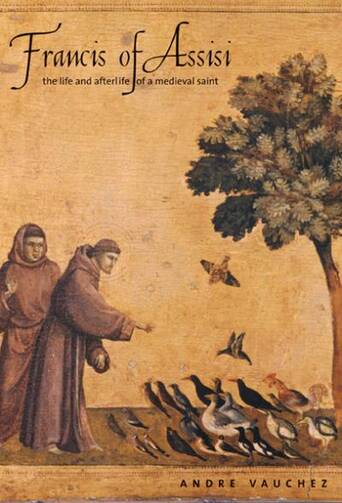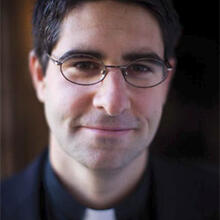As the ballots were being read during the papal conclave last March, it soon became clear to the cardinal electors that Jorge Bergoglio of Argentina would be named pope. When the two-thirds majority was reached, Cardinal Claudio Hummes—a member of the Order of Friars Minor—comforted Bergoglio, who was seated next to him at the conclave. Hummes embraced him, and said: remember the poor. Pope Francis has since explained that at this moment the name “Francis” came into his mind. He thought of the Poor Man of Assisi. He recalled St. Francis’ love for the poor and his commitment to peace.
In his exceptional compendium—for this book is more than a biography—on the life and legacy of Francis of Assisi, Andre Vauchez offers a profound analysis of the Poor Man, his insights into authentic witness to Christ, the religious and cultural context out of which his band of penitents emerged and how Francis’ novel enterprise began to deviate from the dream he held for the life and mission of his Friars Minor. After presenting the life of Francis, Vauchez describes Francis’ death, analyzes the various accounts of his death, and introduces the idea of a second death for Francis. The second death dims the evangelical fire and innovation of the Poor Man of Assisi and replaces the flesh and blood Francis with a concept of Francis. Ironically, this is exactly the inclination that Francis fought against his entire life. To know the gospel was not to do the gospel. The Poor Man rejected the concept, the word, for the Word—living and gesticulating and exemplifying a human life clinging to Jesus Christ. Perhaps, with the name and orientation of Pope Francis I, the Poor Man of Assisi is experiencing a second birth. But who was the Poor Man of Assisi, stripped of centuries of saccharine saintly veneer?
Two themes dominate Andre Vauchez’ analysis of St. Francis: poverty and authenticity. The themes embody Francis, the actual person who died in 1226. I organize my brief presentation of Vauchez’ rich account on these two concepts.
Poverty
After his “turnaround” from knight in training to serious Christian penitent, Francis began to attract men to him on account of his example of penance and life of preaching. As the band of penitents grew, Francis sought approval from Pope Innocent III to affirm the way of life of his small fraternity. They were called the Poor Minors. Later, the group adopted the name Friars Minor. Vauchez clarifies the meaning of the socio-cultural term minoritas. The term signified: “the condition and spiritual state of those who were deprived of power and influence by the fact of their poverty, but also to their lack of learning, their physical illness, or their marginality: in short, the neglected and little people who depended for their survival on Providence and the charity of others” (64). At once, the name identifies the orientation of the group. In the first decade of the Friars Minor, the group was composed of men from various economic backgrounds. The wealthy and educated lived alongside the poor and unlettered. There was no separation between choir monk and lay brother (46). Initially, clerics had no distinction from the other friars aside from their responsibility to offer Mass for the group. The way of life is further delineated in Francis’ rule of 1221: “The rule and life of these friars is this: to live in obedience, in chastity and without anything of one’s own, and to follow the teaching and footprints of Jesus Christ” (105). Francis saw total poverty as crucial to the Minors, because, as Vauchez reasons, for Francis
[T]he less a human being possesses, the more he or she belongs to God: the sovereign Good who is at the origin of all goods, to whom it is proper to give back these goods in a prayer of praise and gratitude. To live in poverty is to return to the perfection of the beginning—that of Adam before the Fall—and to rediscover the only true wealth, which is that of shared love (106).
Vauchez continues to explain Francis’ disdain for money. For Francis, who was remarkably sensitive to the incarnational reality of the Christian God, money reduces things that have dignity in themselves to a monetary value. Money represents a distortion, that is, “by using monetary coinage as a gauge of value, the human person was taking the place of God, who created them, leading to a kind of diabolical transubstantiation” (108). St. Francis sensed that such distortions regarding money permeated religious life as well, and he sought to keep the Minors clear of the ambiguities of traditional religious poverty which was “voluntary and not lived on a daily basis” (109). Yet, as Vauchez explains, at the end of his life, Francis did not identify poverty as a defining aspect of his own vocation. In his Testament, written in the last year of his life, Francis writes about his encounter with the lepers as that which brought him into the life of the minoritas. Vauchez explains:
[T]he fundamental experience he emphasizes is the encounter with lepers, which had shaken up his life by getting him to enter the world of the excluded. These certainly included the indigent; but in letting it be understood that neither the desire to become poor nor the refusal of ownership constituted the decisive factors of his vocation, he was reminding the brothers that at the center of the project of the Minors is the desire to follow in the footprints of Christ and to fully embrace the logic of the Cross, which leads, here and now, to a reversal of values (133).
For Francis, poverty is an aspect of conforming to the charity demonstrated by Christ. The Poor Man of Assisi practiced radical poverty so as to follow Christ.
Authenticity
Vauchez is quite clear that Francis’ contemporaries did not seek out the Poor Man of Assisi because of his good looks, his preaching, his learning or his ability to heal. What they saw in him was authenticity. They saw sincerity. They saw honesty in the way he lived his life and preached the gospel. Vauchez describes it this way:
Others before him [St. Francis]—hermits, recluses or pious pilgrims, but also Cathar bons hommes or Waldensian preachers—had been able to impress people by their austerity or their edifying lives. But in Francis, they vaguely perceived something more: his strength of conviction fascinated them, but even more so did his total sincerity, his constant refusal to allow the least distance between the exterior and the interior, between word and action aim at making it real in this world (74).
Vauchez further describes the novelty of Francis this way:
In contrast to his contemporary St. Dominic, his primary objective was not to defend the Church against its adversaries or even to proclaim sacred doctrine by refuting the errors of heretics, but to communicate to all men and women of his day the fundamental certitudes that animated him: God is good and full of love; we must praise him for having sent into the world his Son, who has suffered for us and wants to save us; the human person has the obligation to respond with such care by changing his or her life without delay, for the day of judgment approaches (78).
Discussion
I urge members of the Catholic Book Club to read this book that brings Francis down to earth. He loved others, he loved the church (including the hierarchy and the Popes Innocent III and Gregory IX) and he loved Christ. He was devoted to the presence of Christ in the Eucharist and respected priests as bearers of the Eucharist. He was stubborn and complicated, and he loved with all his heart. Vauchez’s account of Francis and Cusato’s translation from the French have enriched my faith and nourished my mind and heart.
And so, I offer some questions. Most of my presentation above considers Vauchez’ portrait of Francis. There is much more to this a compendium, and, perhaps, our discussion can include some of the other material in the book.
1. What do you think of the immediate deviation of the Friars Minor from Francis’ vision after the saint’s death? Was it inevitable? Was it partly Francis’ fault for not penning a detailed, juridical rule? Is this simply the reality of a successful organization evolving to institution?
2. What do you find interesting in Francis’ relationship to Scripture? How does his relationship with the word of God differ from that of the scholar-clerics like Bonaventure who would later help define the identity of the Friars Minor?
3. What have you learned about St. Francis and the first decades of the Friars Minor? Are there any surprises? What was the Poor Man of Assisi’s greatest innovation or gift to the church?
Browse past Catholic Book Club selections and interviews with CBC authors.









The conversation will be held on this page on August 16. Feel free to post your questions/comments here in advance. Thanks for your interest!